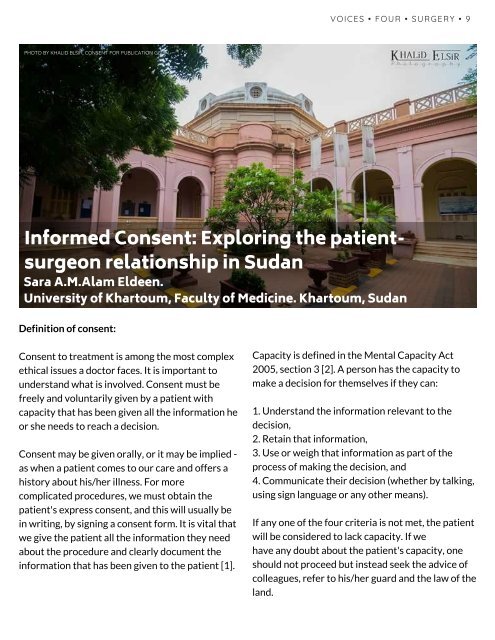Safety First - Voices of One Surgery - Issue 4: December 2018
As we celebrate 10 years of the launch of the World Health Organisation Surgical Safety Checklist and the success it gave, One.Surgery recognises the many challenges that still exist today in the pursuit of providing safe surgery to every patient worldwide.
As we celebrate 10 years of the launch of the World Health Organisation Surgical Safety Checklist and the success it gave, One.Surgery recognises the many challenges that still exist today in the pursuit of providing safe surgery to every patient worldwide.
Create successful ePaper yourself
Turn your PDF publications into a flip-book with our unique Google optimized e-Paper software.
VOICES • FOUR • SURGERY • 9<br />
PHOTO BY KHALID ELSIR, CONSENT FOR PUBLICATION GIVEN<br />
Informed Consent: Exploring the patientsurgeon<br />
relationship in Sudan<br />
Sara A.M.Alam Eldeen.<br />
University <strong>of</strong> Khartoum, Faculty <strong>of</strong> Medicine. Khartoum, Sudan<br />
Definition <strong>of</strong> consent:<br />
Consent to treatment is among the most complex<br />
ethical issues a doctor faces. It is important to<br />
understand what is involved. Consent must be<br />
freely and voluntarily given by a patient with<br />
capacity that has been given all the information he<br />
or she needs to reach a decision.<br />
Consent may be given orally, or it may be implied -<br />
as when a patient comes to our care and <strong>of</strong>fers a<br />
history about his/her illness. For more<br />
complicated procedures, we must obtain the<br />
patient's express consent, and this will usually be<br />
in writing, by signing a consent form. It is vital that<br />
we give the patient all the information they need<br />
about the procedure and clearly document the<br />
information that has been given to the patient [1].<br />
Capacity is defined in the Mental Capacity Act<br />
2005, section 3 [2]. A person has the capacity to<br />
make a decision for themselves if they can:<br />
1. Understand the information relevant to the<br />
decision,<br />
2. Retain that information,<br />
3. Use or weigh that information as part <strong>of</strong> the<br />
process <strong>of</strong> making the decision, and<br />
4. Communicate their decision (whether by talking,<br />
using sign language or any other means).<br />
If any one <strong>of</strong> the four criteria is not met, the patient<br />
will be considered to lack capacity. If we<br />
have any doubt about the patient's capacity, one<br />
should not proceed but instead seek the advice <strong>of</strong><br />
colleagues, refer to his/her guard and the law <strong>of</strong> the<br />
land.








